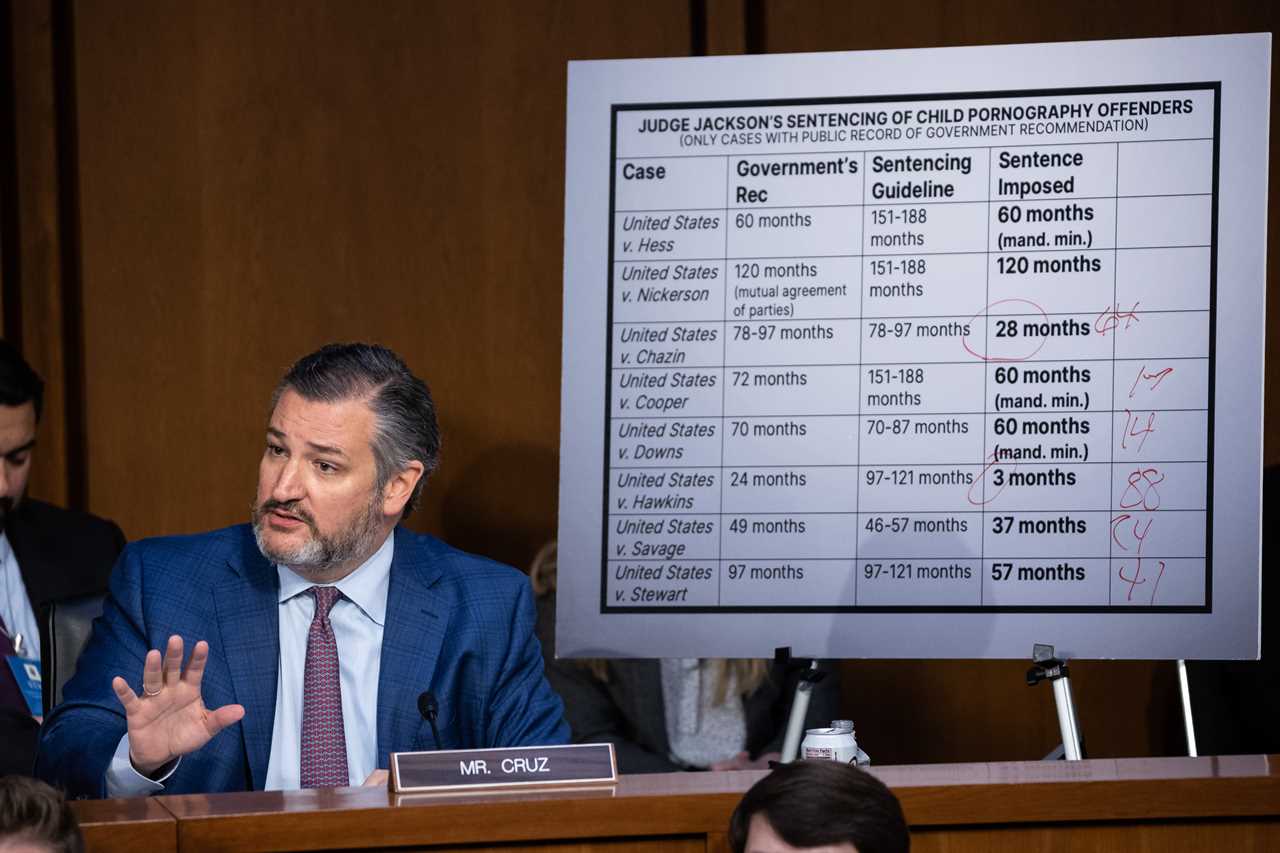
If you are disposed to hold Sen. Ted Cruz in minimal high regard — a sentiment shared by more than a few of his colleagues in the United States Senate, among others — then his performance at the Ketanji Brown Jackson confirmation hearings was fully in character: a demagogic, bad-faith effort on Tuesday to imply that she would bring a racially focused agenda to the Supreme Court, coupled with a “soft on child pornographers” assault today.
The same can be said of Missouri’s Josh Hawley, whose attempts to link Jackson to her clients as a public defender have been condemned even by many conservatives. Ditto for Arkansas’ Tom Cotton, whose “do-you-think-criminals-should-be-in-prison?” rants made him seem like Inspector Javert after the Adderall had run out. (By contrast, the substantive and civil conversation between Texas Sen. John Cornyn and Jackson could serve as a model for how such hearings should be conducted, though it notably did not win an inch or a pixel of coverage.)
As a critique of the nominee, the arguments of Cruz and his fellow Republicans did not border on the absurd — they fell over the cliff. If, for instance, there was any evidence that Jackson brought any affinity for critical race theory into her judicial work, you might have thought someone would have unearthed it in Jackson’s decade-plus service on the federal bench.
But judging Cruz and company by that standard misses the point. This was not a group of senators engaging in skeptical or serious questioning of a Supreme Court nominee. This was a trio of presidential candidates appealing to the base that will choose the next Republican White House nominee. And from that perspective, the trio accomplished what they set out to do. More broadly, these efforts fit perfectly into an approach that has rewarded the GOP for more than half a century: peeling away traditional Democratic voters with the twin factors of race and crime.
It’s hard to grasp just how long these matters have riven and driven our politics. In the early 1960s — before the explosion of urban violence — the prospect of racial backlash was emerging as a significant political factor. In 1964, GOP nominee Barry Goldwater, an opponent of the Civil Rights Act of that year, won five once-solidly Democratic Southern states. More significantly, the state of California passed a constitutional amendment striking down fair housing laws by overwhelming votes — a nearly 2-1 majority.
Four years later, when violence was erupting in many cities, and as crime rates were spiking, independent candidate George Wallace and law-and-order Republican candidate Richard Nixon combined to win 57 percent of the national popular vote.
In the 1970s, busing to achieve racial integration in schools helped drive white working-class Democrats in Macomb County, Michigan into the arms of Republicans. In the 1980s, crime was the key to persuading California voters to remove three justices from the state's Supreme Court. It took Bill Clinton, with his “blue wall” of police officers, his full-throated support of the death penalty and his “Sister Souljah” confrontation with a Black rap artist, to stanch the flow of white working-class voters away from Democrats. (Even as his campaign manager said “it’s the economy, stupid,” the attention to cultural issues was an important part of Clinton’s appeal.)
If we needed a reminder of the power of race to divide, the often crude, racist undertones — or overtones — of Donald Trump’s campaigns delivered. The ugly rhetoric, which seemed to so many of us as disqualifying liabilities, turned out to have been assets. Features, not bugs. It’s the reason his most serious flaws of character, intelligence and judgment are all but irrelevant to the Republican base.
More recently, the issue of parental school involvement proved potent last year in the Virginia governor’s race; state legislatures across the country are moving to ban critical race theory from the public schools, where it is not taught.
It’s important to note that the grievances that Republicans have exploited and benefited from were not and are not pure fantasies. Crime did explode in the 1960s and stayed high for decades; urban violence did cost hundreds of lives and thousands of small businesses. School busing did affect working class families more than the affluent, who frequently found private schools for their kids. Today, there are legitimate questions about what kind of material makes sense to share with 5-year-old children (although it does seem that, for example, if you are teaching Texas history to Texas school children, you might want to include just how key the maintenance of slavery was to the Texas Republic’s founding fathers).
But it’s just as important to understand the dynamic that is playing out at these hearings. This was the chance for a trio of presidential aspirants to display their embrace of the most toxically powerful currents flowing through our politics, and to do it while confronting a nominee who symbolizes that primal fear of “replacement” — the sense that “they” are taking power from “us,” which has made Tucker Carlson a powerful political presence and which continues to make Trump his party’s likely next nominee.
As an inquiry into the merits of a Supreme Court nominee, the performances of Cruz and company was a disgrace. As political stagecraft, it was “mission accomplished.”
----------------------------------------
By: Jeff Greenfield
Title: Opinion | For Ted Cruz and Company, the Jackson Hearing Was ‘Mission Accomplished’
Sourced From: www.politico.com/news/magazine/2022/03/23/ted-cruz-gop-jackson-hearing-racial-backlash-00019812
Published Date: Wed, 23 Mar 2022 15:53:41 EST
Did you miss our previous article...
https://consumernewsnetwork.com/politics-us/after-44-years-i-fled-moscow-with-a-suitcase-2-computers-and-a-dog






